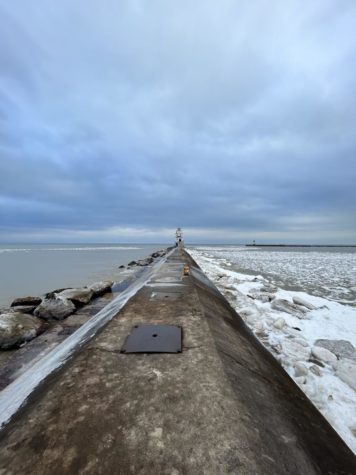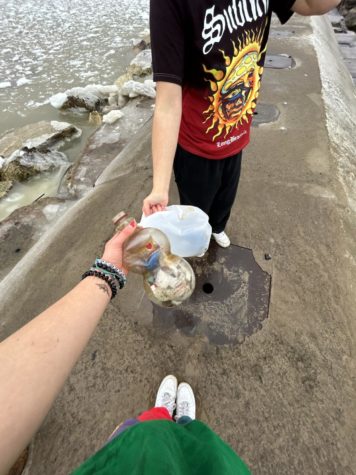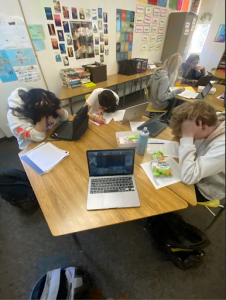Climate Change Affects the Oceans
And what you can do to help
photo taken on lake Michigan, picking up garbage. photo credit: greyson
January 18, 2023
Have you ever been to a place with an ocean? When you think of the ocean you probably think of warm sunny beach days, clear blue water, and beautiful sunsets on the beach. Now think of an ocean filled with more plastic than there is fish. Does that sound like a relaxing day at the beach or an unpleasant time? This may be the reality in the future. This information comes from the article World Oceans Day Shines Spotlight on Marine Plastic Pollution. Scientists predict that, “By 2050 there may be more plastic than fish in the ocean.” 2050 seems far away, but in the grand scheme of things it’s really not. The ocean has been around for billions of years and the things that are killing it are man made issues such as pollution and climate change. Climate change and pollution are a huge issue to the environment and something needs to be done before the damage is irreversible.

We are the issue. The ocean has been around for billions of years, and thanks to human activity, the ocean’s health has been decreasing severely over time. Human activity Is the cause of Increased greenhouse gas concentrations, and climate change. Over the last century, burning of fossil fuels like coal and oil has increased the amount of atmospheric carbon dioxide and other greenhouse gasses in the atmosphere, causing a rise in temperature that is detrimental to the environment, including the ocean.
“If humanity’s greenhouse gas emissions continue to increase, according to a study released… roughly a third of all marine animals could vanish within 300 years.” stated in the article Ocean Animals May Face Mass Extinction from Climate Change, Study. The information from this article shows that many sea animals will be extinct or endangered if we keep doing what we are. The loss of many populations can impact the ocean and other environments negatively, and losing multiple different populations of species would be very bad. This is bad because loss of a species messes up a lot within ecosystems, and it causes issues in food chains, such as little to no food available or over population in species. Finding more clean and reliable energy sources will help at least a little. Besides greenhouse gasses, another big issue is pollution, Which is man made. According to the article World Oceans Day Shines Spotlight on Marine Plastic Pollution, “Plastic comprises up to 90% of ocean debris with trillions of pieces circulating ocean currents, but much of its impact remains unknown.” Humans are creating irreversible problems for the ocean and there is not much that can be done about the damage already been done. The actual harm being done still remains unknown, scientists have not yet found out how bad pollution is affecting the oceans.
Have you ever thought about what the world would be like without humans? Would Climate change and pollution still be an issue? Mr. Akemann stated “No, it wouldn’t be an issue… Were having the effect. Life would continue on and there would be other life forms.” This gives us an interesting perspective to think about. If humans weren’t around, or didn’t do harmful things to the environment we wouldn’t have this issue.
What can we do? You may be thinking “What can I do to help solve this problem?” There are many ways we can do to do our part with the issue of climate change and pollution. All it takes is slight changes in our daily schedule to become more sustainable. Mr. Akemann, the Biology and Marine Biology teacher at SPASH states; “One thing that is very obtainable to all of us right now is the light switch. Little things, believe it or not, such as turning off light, using less water, using cold water for washes, all of that is obtainable to everyone in their own personal economics.” We should all try to be as sustainable as possible to help better the environment. If everyone does simple these tasks we’d see improvements in the environment.
Why this does it matter? Wisconsin is nowhere near the ocean so why does it matter? Believe it or not, even though we are far away from any ocean, it still affects us. This is going to cause irreversible problems. According to an article called plastics in the ocean affecting human health from geology and human health, “the toxins from the plastics have entered the food chain, threatening human health” meaning, if you are consuming any seafood, or anything into contact with the ocean it could contain harmful toxins from the plastics in the ocean, also known as micro plastics.
The article is called; tracking global marine microplastics. The article elaborates on micro plastics, stating that “Microplastics have been found in the stomachs of many different types of wildlife, from the smallest species of plankton to large whales. Microplastics have also been found in the air, tap water, sea salt, bottled water, beer, and the fish that humans eat.” microplastics are a big problem for the ocean and ocean animals but also for humans.
Hopefully in the future we see improvements with climate change, and pollution, but for now we can stay focused on what we can change in our lives to help fight climate change.





































































